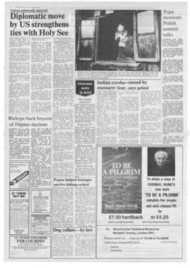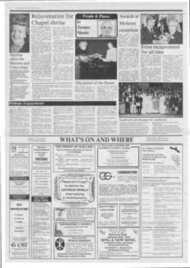Page 4, 13th January 1984
Page 4

Report an error
Noticed an error on this page?If you've noticed an error in this article please click here to report it.
Tags
Share
Related articles
Two Cambridge Societies
May I, As Publisher Of The Course Of Instructions Given
Cambridge Student Lapsings
Cantab Cheerio Row
Lapsing 'statistics' And Religious Belief
Root cause of lapsing
THE NOW quite extensive correspondance in your columns triggered off by the publication of details from the report by Fr Jenkins of the Cambridge University Catholic Chaplaincy has not so far squared up to examining why the religious formation the young receive today is not preventing them lapse at an unprecedented rate.
If the three main influences in the formation in the faith are the home, the school and the liturgy, it is to these sources that we must look for means of developing a more succes-sful formation than we know at present.
While it may not be politely 'done' to say so, the truth is that in many ordinary Catholic homes today there is extensive confusion and disorientation in matters of the faith. Where there is little solidity, little can be given to the next generation.
The schools? At the junior level, while modern catechesis seems very cosy, it lacks the solid base given by the "Penny" Catechism. At the senior level, many pupils seem to know the faith in the manner required to pass a not very popular exam subject, but they acquire little to no 'feel' for it. The brain has been involved, but not the heart.
Asto the liturgy, has it inspired the young? I think not. Has it stimulated whatever sensitivities they may have for the beauty of the Divine and the reverence due to God? I think not. Its didactism and inescapable comprehensibility have not produced much love for the Mass. No wonder so many miss Mass as soon as they can 'get away with it' well before leaving school, let alone going on to higher education.
Recriminations between homes and schools for the present situation can only be sterile, since homes and schools do not control events within the Church. Both have had a cerebrally emphasising renewal imposed upon them for better or for worse. I think it has been for the worse, since so much of the content of this renewal was specifically aimed at the young and "The proof of the pudding is in the eating".
Somewhere, somehow, a better balance must be found between our ability to 'know' and our ability to 'feel'; this can only be researched under the direction of authority, only authority can impose the end product. and I submit to authority that in matters as mysterious as those of faith and man's soul the hearts of ordinary people, the vast bulk of the human race, are probably more important influences than their brains. If the `brainy' at universities lapse in droves . . ?
J C I, Inman Bury St Edmunds' Suffolk OF COURSE you are right, in your editorial, Dec lb, to express concern at the quoted numbers of undergraduates who "lapse" from the faith; but only in the sense that one is properly concerned at just one person lapsing from the faith.
Anyone familiar with statistical analysis would be aware that the sample quoted is both so small and so poorly controlled that no reasonable deduction could be drawn. It follows that those of your correspondents who protest at certain deductions by proposing alternative ones themselves are not basing their objections on this premise of statistical insignificance.
Despite this point, associated matters of importance have been raised. These seem, in certain respects to be dulled by a confusion.
It is essential, for clarity of discussion. to distinguish between religious knowledge and religious practice: this clarity is needed in the present discussion of Catholic chaplaincies to the universities.
If schools were to make this distinction clear not only in the teaching approach to religious education but also to their pupils it could have the great benefit that at least the more senior and intelligent pupils might grasp the extremely high intellectual content in Catholic theology.
This could have several effects. Firstly, it might encourage the lapsed intellectual to continue study of the subject as an academic exercise in its own right. a status to which theology is well entitled: especially might he be convinced if the teacher was to stretch him beyond his ability so that he might come to admit himself that the understanding, practising, Catholic really knows what he advocates.
Secondly, this could promptly defeat that rather pathetic attitude — it is certainly not an intellectual argument — that religion is all superstition. an idea so many unthinkingly propose to the undergraduate.
Thirdly, if the student can be persuaded to continue his study, discuss, and argue, then he finds this a powerful deterrent to lapsing: as C S Lewis recognised in Screwtape Letters the last thing that the devil wants us to do is to reason.
It follows that the University chaplaincy is doubly important. It acts as the parish church for the Catholics of the university, a point made quite plain by Archbishop Heenan in an address when at Liverpool: then also it provides a resource of intellectual exercise in theological matters for both the Catholics and others of the university.
I have a clear impression from their support that the senior clergy of all denominations recognise this dual function of their chaplains: one hopes that we all recognise the onerous nature of this double function placed upon all our university chaplains.
Dr J C Gibbings C Eng Chairman, Chaplaincy Association Liverpool
blog comments powered by Disqus











